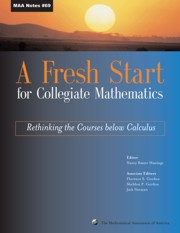Book contents
- Frontmatter
- Preface
- Contents
- Introduction
- Background
- Theme 1 New Visions for Introductory Collegiate Mathematics
- Theme 2 The Transition from High School to College
- Theme 3 The Needs of Other Disciplines
- Theme 4 Student Learning and Research
- 19 Assessing What Students Learn: Reform versus Traditional Precalculus and Follow-up Calculus
- 20 Student Voices and the Transition from Reform High School Mathematics to College Mathematics
- Theme 5 Implementation
- Theme 6 Influencing the Mathematics Community
- Ideas and Projects that Work: Part 1
- Ideas and Projects that Work: Part 2
19 - Assessing What Students Learn: Reform versus Traditional Precalculus and Follow-up Calculus
from Theme 4 - Student Learning and Research
- Frontmatter
- Preface
- Contents
- Introduction
- Background
- Theme 1 New Visions for Introductory Collegiate Mathematics
- Theme 2 The Transition from High School to College
- Theme 3 The Needs of Other Disciplines
- Theme 4 Student Learning and Research
- 19 Assessing What Students Learn: Reform versus Traditional Precalculus and Follow-up Calculus
- 20 Student Voices and the Transition from Reform High School Mathematics to College Mathematics
- Theme 5 Implementation
- Theme 6 Influencing the Mathematics Community
- Ideas and Projects that Work: Part 1
- Ideas and Projects that Work: Part 2
Summary
Introduction
For the last decade, the reform of mathematics education at the college level has been accompanied by the so-called “math wars.” One dimension of this struggle has involved calls to prove that non-traditional courses are at least as effective as the courses they are designed to replace. From one point of view, this is certainly a reasonable request, especially as all of higher education faces pressures for accountability. From another point of view, I am not aware that anyone has ever been asked to prove anything about the effectiveness of the traditional courses. Most studies looking at the impact of a nontraditional approach to student learning have focused on the developmental mathematics/college algebra level and at the calculus level. For instance, Baxter et al [1] compared student performance in traditional versus reform calculus and the students' performance in subsequent science and engineering courses.
In this article, we look at the results of a comprehensive, multifaceted study, which we undertook in fall 1999, that compared student performance, success, retention, and attitudes in a reform version of precalculus to that in a traditional version of the same course. Another component of the study involved student performance, success, and retention in the follow-up calculus course based on the type of precalculus experience the students had.
Background
The precalculus offering at New York Institute of Technology (NYIT) is the standard college algebra and trigonometry course stressing traditional drill-and-skill techniques presumed to be necessary for calculus.
- Type
- Chapter
- Information
- A Fresh Start for Collegiate MathematicsRethinking the Courses below Calculus, pp. 181 - 192Publisher: Mathematical Association of AmericaPrint publication year: 2006



